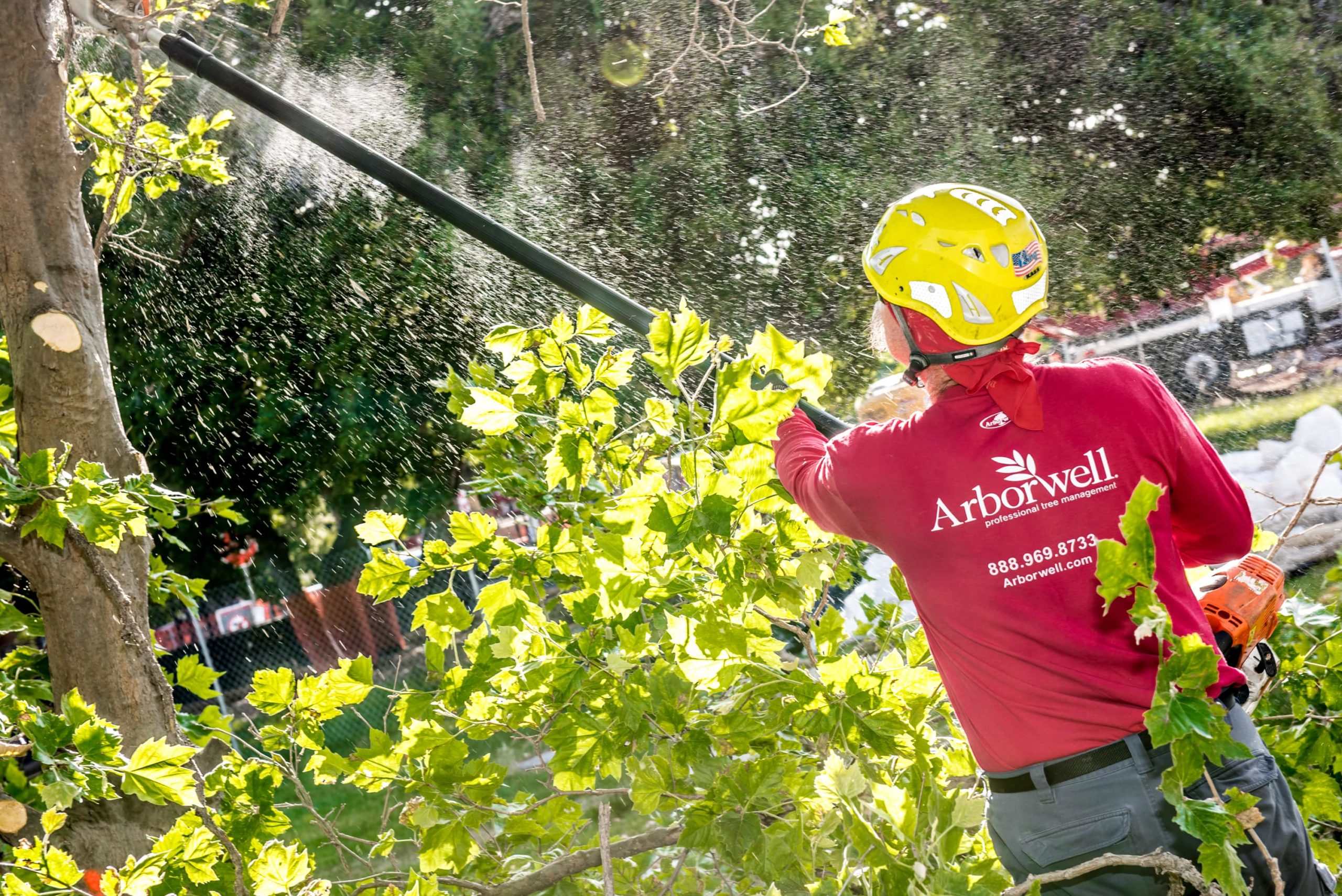If you want to talk to someone who knows a thing or two about taking the risk to become a tree care entrepreneur, Peter Sortwell is your guy. Sortwell is the founder of Arborwell Professional Tree Management, which serves mostly private commercial customers (e.g., large property management companies, corporate campuses, etc.) throughout California and Washington. Sortwell recently sat down with Tree Views to tell his tale in the hopes of inspiring others to reach for success.
Putting pen to paper
It all started in 2000. Sortwell, who grew up in the industry, had lost his tree care job of 15 years due to corporate restructuring. Although he was working to make connections and find something new, his search was unsuccessful — it turns out he was just “too expensive.” Frustrated with the lack of options available to someone with so many years of experience, Sortwell started weighing the options of branching out on his own.
“I went to an entrepreneur’s seminar,” Sortwell said. “It gave me an emotional high — you know? They played a video about Steve Jobs and all these other entrepreneurs talking about how hard it was to start these big corporations and companies. At the end of the day the facilitator said, ‘OK, obviously you guys are in here for a reason, so tell me what you would do if you could start your own company?’’’
The group then got an hour to write out their individual company ideas, which they subsequently presented.
“I got up and I started doing my presentation about starting a tree service company,” Sortwell said. “My fellow classmates were all saying, ‘Wow! This is great, you mean you’d come to my house and fix my tree for me? I’d hire you.’”
Feeling encouraged from the receptive feedback, Sortwell raced home to present his idea to his wife. Her response? OK.
Taking action
With the approval nod from his family, Sortwell began the next steps to secure financing — but he hit a roadblock. Even though he found a small, already established tree care company looking to sell their business, he just couldn’t seem to get a loan.
“Banks had no interest in lending me money even with a business plan, because I didn’t really have an income,” Sortwell explained. “I went to the owner of the company and I told him I couldn’t get a loan to buy him out and he said, ‘Well you’ve got your house, why don’t you refinance it?’”
Sortwell went again to his wife with this idea, expecting that they would throw in the towel.
“She said, ‘If that’s what we have to do, then that’s what we have to do,’” Sortwell said. “I said to her, you understand if this company doesn’t make it, we’re out of a house and we’re homeless, and she said, ‘Yeah, I get it.’ So, we did it. We refinanced our house to get the company.”
Even though the company he purchased only included two trucks and a small infrastructure, Sortwell knew it was the key to creating something bigger, and he was right. Today, Arborwell boasts seven operating locations, around 200 employees, 100 servicing trucks and 200 pieces of equipment.
Earning success and building growth
Although his business is thriving now, Sortwell is the first to admit that it took time, patience and a lot of help to get him where he is now.
“The first 18 to 24 months were rough — we didn’t sleep very well at night,” Sortwell said. “It seemed like there was always something going wrong, but once we got a couple of solid customer contracts lined up, things started looking up.”
Sortwell said if he had to narrow it down, his three key takeaways that secured his business success were:
- Building customer relationships and sales
- Monitoring cash flow
- Maintaining low overhead
He also made sure to take a strategic approach to business growth every time the opportunity arose. Sortwell has also invested in efforts to focus his brand messaging and reach their customers. Read more on how he does this on this previous blog post.
“Our growth philosophy has always been to grow based on customer needs, not just for growth’s sake,” Sortwell said. “We establish a relationship with our customers, and because they typically have properties all over, we focus on their geographies and go from there. A customer might say, ‘I wish there was someone that did what you do in Seattle; there’s no one out here that does what you do’ and that’s all we needed to hear — we’re coming to Seattle.”
To those who are starting out, Sortwell said confidence in your original business plan is key to help manage the stress of all the risks being taken.
“When I had bad days, I would reach into the drawer of my desk and pull out that business plan and start reading through it,” Sortwell said. “I would remind myself of all the things that I wrote down that were going to make my business successful — because you forget as you get caught up in the daily hassles and you lose sight of the big picture. It was a nice little ‘bible’ for me.”
For more tips and trends in starting your own tree care business, view more articles on the Tree care, rental and landscape blog.
This article contains third-party observations, advice or experiences that do not necessarily reflect the opinions of Vermeer Corporation, its affiliates or its dealers. Advice or suggestions provided in this article are statements of general applicability that may or may not apply to individual businesses, whose circumstances and operations may vary.
Vermeer, the Vermeer logo and Equipped to Do More are trademarks of Vermeer Manufacturing Company in the U.S. and/or other countries. © 2017 Vermeer Corporation. All Rights Reserved.

